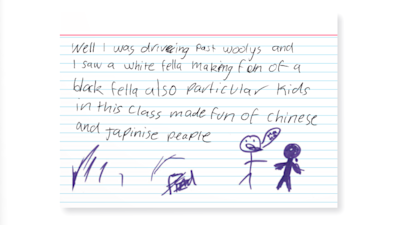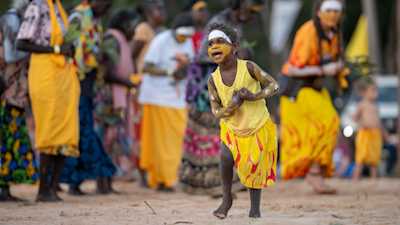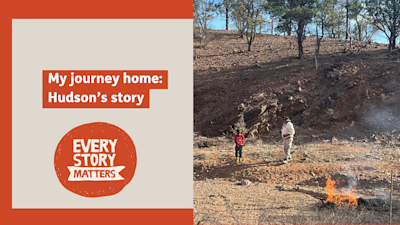Liz Lewry from Life Without Barriers Aged Care team reflects on this year’s NAIDOC Week theme.

Image: Liz and her mother sit side by side.
This NAIDOC Week, Liz Lewry, Aged Care Operations Manager, shares her reflections on what this year’s theme, ‘For Our Elders,’ means to her.
I was born in the Torres Straits and grew up in Port Douglas. I come from quite a large family. My mother is from Torres Strait. As a child, I saw my Elders a lot, and I still do. For me, family is everything. What I love is our rich culture and traditions - the way we do things and what we value in life. Elders shared the traditional stories from our ancestors.
The most important things my Elders have given me are my culture, our traditions, our history and my identity today.
My Aka (grandmother) comes from Darnley Island, and her ancestors originated from Rotuma Island in the Pacific. My Athe (grandfather) came from Badu Island in the Torres Straits. His father came from Singapore – when they brought over a number of men from Singapore to help build the Pearl Luggers in the Torres Strait.

Image: Photos of Liz's Aka and Athe.
The Torres Straits is made up of the largest number of nations from around the world - nearly every family in the Torres Strait has connections to other parts of the world! It's a beautiful, rich history and culture through the Torres Straits.
My father is non-indigenous. He travelled to the Torres Straits working on the boats and asked permission from my Athe and the Elders to marry my mother. Their condition was that he had to learn the culture and the traditions and learn how to provide for his family the cultural way. So, I grew up with traditional food, caught in the traditional way, by my father.
And for my mother, everything was about my Torres Strait Islander culture. Mum taught us all the traditional ways and our cultural protocols. I was taught from a really early age about traditional song, dance, cooking, feastings, and how to behave in cultural settings. How to treat and respect others and especially our Elders.
For me, it's really important - I've always lived from what my Elders taught, what my parents taught us, and now I've also taught my kids.
I've looked to my Elders to help my sons because there's men's business that I can't teach them. They've learnt all the ways of traditional hunting and gathering - and the importance of never taking more than you need and that what you have must be shared with others.
An example is when the men go out to do their traditional hunting, and when they come back, everybody is involved. And I love it. Where my mother's home is – a village on Hammond Island - we'd be down at the beachfront, and everybody's down there.
The dinghies come in, the men have got their catch, and you help. There's a big cleanup: there are turtles, dugongs, and fish, and it's a big affair. Even the kids help with the cutting and cleaning up. Then the food gets divided and shared amongst all family. It's important to make sure that food is never wasted. So when you're hunting, it's key that you never take more than what you need, and you share what you have.
You look after the Elders and make sure they've got food. Whether you take them the catch or you cook it and take it to them. That's the biggest thing that sticks in my head of what I learnt from my Elders, and it’d be a shame if it ever got lost through the generations.
The women, they grow: they look after the gardens and grow their food. They also walk the reefs in low tide to gather clam shells. They do the same thing - they look at what they have, divide it up and share that food as well.
There is no generic answer to the question ‘What is an Elder?” that suits everyone or suits every culture and tradition. It’s a very broad question, and it's not the same for everyone – it's important to recognise that. I can only answer for myself – what I grew up with in my knowledge about how Elders are determined.
From my culture and my family - what I've been taught - an Elder is not just about being an older person, even though usually they are. Sometimes Elders are established from the position and rank in your family and where it sits in the line of your family tree.
My mother is an Elder. She is the eldest sibling in her family of nine children. My mother became an Elder when both of her parents died. She was the Elder of that cluster.
But the reality is, people pass on, and sometimes an Elder becomes one because, in their lineage, they are the last one left. I have a very valued uncle who is the last line of his family and became an Elder in his 30s.
Elders are the carriers of knowledge. Their role and purpose are four things: to pass on culture, traditions, history and identity. And how they do that is in many different forms.
Elders are there to guide us and make sure the culture doesn't die – that who we are as people does not die. Because we can't forget, and should never forget, where we come from and how we got here.
Elders will have different roles in different communities. Certain islands might have Elders within that island group, so they're the ones you would consult with about things that affect that community and the people within the community.
Within my culture and what I grew up with, every older person is respected and held as an Elder. That respect is really important. Wherever they are in the family lines, that respect for the older generation has always got to be there. We value them all as Elders.
In my work in Aged Care, I have principles that I operate under at all times. No matter what an older person’s culture or tradition is, as aged care support workers, we need to look at how we operate and how we can be flexible within that to understand what it means to that person within their culture and traditions and be able to work around it.
When my staff have asked my advice about Aboriginal and Torres Strait Islander people we support, I’m lucky I'm able to help them understand: you're seeing this, but this is what's happening, and this is what you need to consider when you are having conversations with the person.
It’s about getting people to think differently - think outside the box, be open and listen.
You need to understand what's happening for a person with a much broader lens. There are a lot of things that can be unspoken, but you observe, and you listen, and you'll pick it up.
When you've lived and breathed within a culture - and I think it's any culture – you can look deeper into some things when you need to.
Anybody that's come from a background where their culture is valued and respected, and they live their life around their culture, usually you're open to these things just naturally because it's something of value to you in your heart, and you can understand and empathise with others that have their culture, that is very much a part of their lives.


